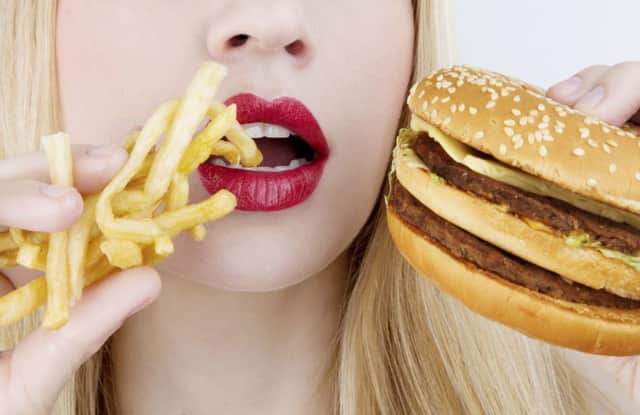The fast food diet to fight flab and diabetes


Fasting by limiting calorie-intake to a routine eight to 12-hour time slot may help keep off the flab and prevent and even reverse high cholesterol, obesity and type 2 diabetes.
Yet someone eating food bearing the same calories over a longer period may pile on the pounds and suffer ill-health.
Advertisement
Hide AdAdvertisement
Hide AdResearch suggests “fasting” affects the balance of bacteria found in the gut which control metabolism.
The human body clock predicts when people are likely to eat so it can burn off the food they ingest. And one-off lapses in fasting won’t undo the benefits of “time restricted” eating.
To combat the obesity epidemic, people now are being advised to limit the amount of time they eat, adopting a pattern similar to that of people a century ago, health experts now say.
Associate Professor Satchidananda Panda, at the renowned Salk Institute in California, said: “These days, most of the advice is ‘you have to change nutrition, you have to eat a healthy diet.’
“But many people don’t have access to healthy diets. So the question is, without access to a healthy diet, can they still practice time-restricted feeding and reap some benefit?
CONNECT WITH THE SCOTSMAN
• Subscribe to our daily newsletter (requires registration) and get the latest news, sport and business headlines delivered to your inbox every morning
“We found that animals fed within a window of eight to 12 hours had a number of protective and therapeutic health benefits compared with animals allowed to eat the same number of calories from the same food source at any time.”
The study. published in the journal Cell Metabolism. involved experiments in mice but researchers said the findings could apply to humans too.
Advertisement
Hide AdAdvertisement
Hide AdTwo years ago Prof Panda showed mice fed a high-fat diet but only allowed access to that diet for only eight hours a day, were healthier and slimmer than mice given access to the same food for the whole day, although they consumed the same number of calories.
Time restriction better synchronises the function of hundreds of genes and gene products in the body with the predictable time of eating.
In mice fed a variety of high-fat and high-sugar foods, the strategy could help prevent the development of metabolic problems, and the benefits were proportional to the duration of fasting the animals experienced.
The protective effects were maintained even when the mice were given “cheat days,” when time-restricted feeding was temporarily interrupted by allowing them free access to food during the weekends.
And time-restricted feeding halted or reversed the progression of metabolic diseases in mice with pre-existing obesity and type 2 diabetes.
In a second study, Prof Panda looked at the effects of different eating patterns on bacteria that reside in the gut which make up the gut microbiome and which is known to affect the body’s metabolic processes.
Results found the gut microbiome shows dramatic daily cyclical fluctuations in the levels of different bacteria. Diet-induced obesity upset many of these body clock bacteria fluctuations, which were, however, partially restored by time-restricted feeding.
Prof Panda added: “The effect of eating time to nudge the gut microbiome and host physiology towards health or disease without altering genes, nutrients, calories, or drugs opens new research avenues and cost-effective healthcare strategies.
Advertisement
Hide AdAdvertisement
Hide Ad“For biologists, this offers a novel paradigm to understand the [root causes] of metabolic diseases and undesirable gut microbiomes in modern lifestyles marked with erratic eating patterns.”
SCOTSMAN TABLET AND IPHONE APPS